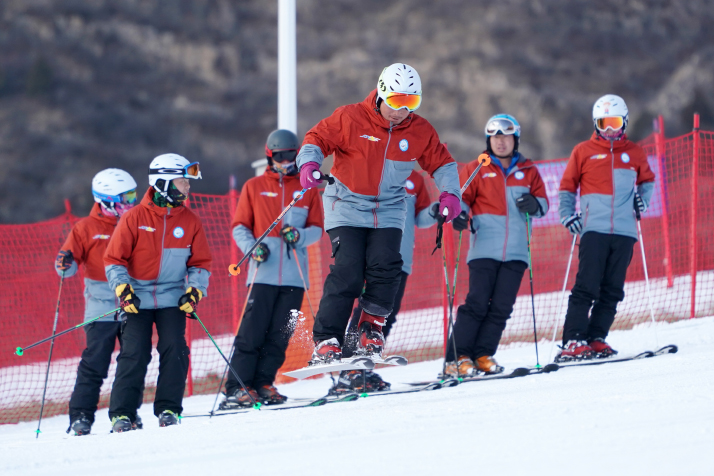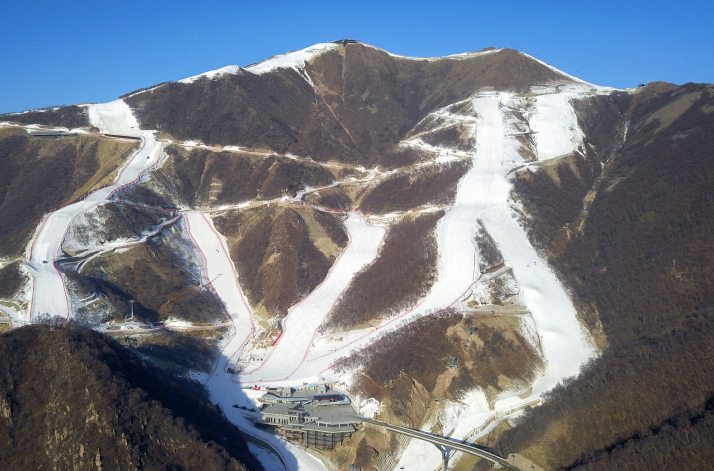| China |
| Olympic winter games spur growth of snow economy in Beijing suburbs | |
|
|
 Local villagers receive professional skiing training in Shijinglong Ski Resort on December 7, 2017 (XINHUA)
It took only one year for Zhang Kai, a villager in Yanqing District in northwest Beijing, to triple his monthly income, and his job is fascinating to many young people: a ski instructor. A junior college graduate, Zhang used to make a living by doing odd jobs as an electrician. The monthly income of around 2,000 yuan ($309.8) could barely support the family. The life changer came when the district initiated a training program for ski instructors in the 2018-2019 winter season. A fan of the sport, Zhang returned home from another district of Beijing after hearing about the recruitment and became one of the 160 students of the program. The program was part of Yanqing's efforts to form a pool of practitioners of snow sports to support the Olympic Winter Games and Paralympic Winter Games to be held in 2022. The district is one of three competition zones for the events, where 21 gold medals for the Olympic Winter Games and 30 medals for the Paralympic Winter Games will be up for grabs. Zhang finished the training successfully and obtained certificates to become an instructor. Now he works in a local ski resort and earns around 30,000 ($4,647) yuan in one snow season. "It is the Olympic Games that has helped me realize my dream of a skiing career," he said. Powerful driver The events will be cohosted by Beijing and the city of Zhangjiakou in the neighboring Hebei Province, with Beijing being the venue for ice sports and the other for snow sports. Yanqing was assigned to assist Zhangjiakou with the snow sports. With over 70 percent of its land being mountainous, Yanqing has an average altitude of over 500 meters and is known as Beijing residents' summer resort. In the winter, it has Shijinglong Ski Resort, the largest of its kind in Beijing, among other destinations for winter activities. However, the district has failed to attract tourists despite the rich resources it possesses. In 2019, the district registered revenue from tourism of only 9.2 billion yuan ($1.4 billion), while Beijing's total revenue from tourism stood at 622.5 billion yuan ($96.4 billion). Being designated as one of the competition zones has brought much-needed attention and resources. Two competition venues, the National Alpine Skiing Center and the National Sliding Center, are under construction in Yanqing. Built on the Olympic Games standards, these venues are the best of its kind in China and represent a fundamental upgrade of the district's facilities for snow sports. On December 1, 2020, Yanqing High-speed Railway was put into operation. As a branch of the Beijing-Zhangjiakou High-speed Railway, the 9.33-km segment shortens the travel time from urban Beijing to Yanqing to around half an hour. The Yanqing Station was upgraded to a hub that combines multiple means of transportation and can handle around 18,000 passengers each day. As resources and attention to Yanqing mount, the district is leveraging the great opportunity to enlarge and upgrade its snow economy and engage more of its 300,000 population, especially the 40 percent living in the villages, in the industry where the income is higher. Since 2018, the district has trained around 15,000 people as ski instructors, volunteers and for other related occupations. Many villagers like Zhang have become specialists and found new jobs with higher pay. New activities were initiated to encourage participation in snow sports. For the 2020-21 snow season, 13 competitions have been planned, including both professional and amateur ones, for different groups such as adolescents, college students and company employees. There were also activities for residents and tourists to experience the sports. The district is also counting on the events to ignite passion for winter sports as part of China's drive to improve people's health via sports. In 2019, the district made a five-year action plan to make snow sports and knowledge about the Olympic Winter Games a focus in schools across the district. So far, over 2,000 students have mastered the basic skiing and skating skills. In some schools, simple skating rinks were built, and skiing and skating teams were formed.  the National Alpine Skiing Center in Yanqing, Beijing, on January 19 (XINHUA)
Sustainable development It has been a focus of the organizers of the games to make sure the events will not cause damage to the environment and that they will continue to bring benefits to the locals after the Games is over. The facilities for the events in Yanqing, including the alpine skiing center and sliding center, as well as the athletes' village and press center, were planned in line with the topography of the mountains with no damage to the landform. As for the 22,000 plants that must be removed, a special part of the forest park for the events under construction nearby was reserved as their new home. In building the facilities, surface soil removed from the construction site was coded and preserved, and then refilled after the construction was done to restore the original status of the land. The construction was scheduled with consideration for the activities of the wild animals and passageways were built for them to cross roads. Wild animals were seen returning to the periphery of the buildings even before the construction was completed. On May 15, 2020, a sustainability plan for the two events was released jointly by the International Olympic Committee, the International Paralympic Committee and the Beijing organizing committee for the events to provide guidelines on ensuring sustainability throughout the preparation and implement of the two events. The plan outlined measures for realizing 37 tasks ranging from environment protection and improvement to the development of key industries and upgradation of cities. For Yanqing, a task was particularly proposed to forge a group of recreation industries related with snow sports. The target is to enhance the district's appeal to tourists as part of the more ambitious initiative to build a Beijing-Zhangjiakou belt of tourism spots featuring snow sports. The prospects are promising for districts like Yanqing. According to the 2020 report on the development of China's ice and snow-based tourism published by the China Tourism Academy, the snow season between 2018 and 2019 saw 224 million visits to ice and snow tourism destinations, generating a revenue of 386 billion yuan ($59.8 billion), up 13.7 percent and 17.1 percent respectively from the last snow season. The report estimates that in the 2022-23 winter season, when the Olympic and Paralympic winter games will be held, the numbers will stand at 340 million and 680 billion yuan ($105.3 billion), respectively. (Print Edition Title: Skiing Upsurge) Comments to hufan@chinafrica.cn |
|
||||||||||||||||||||||||||||||
|